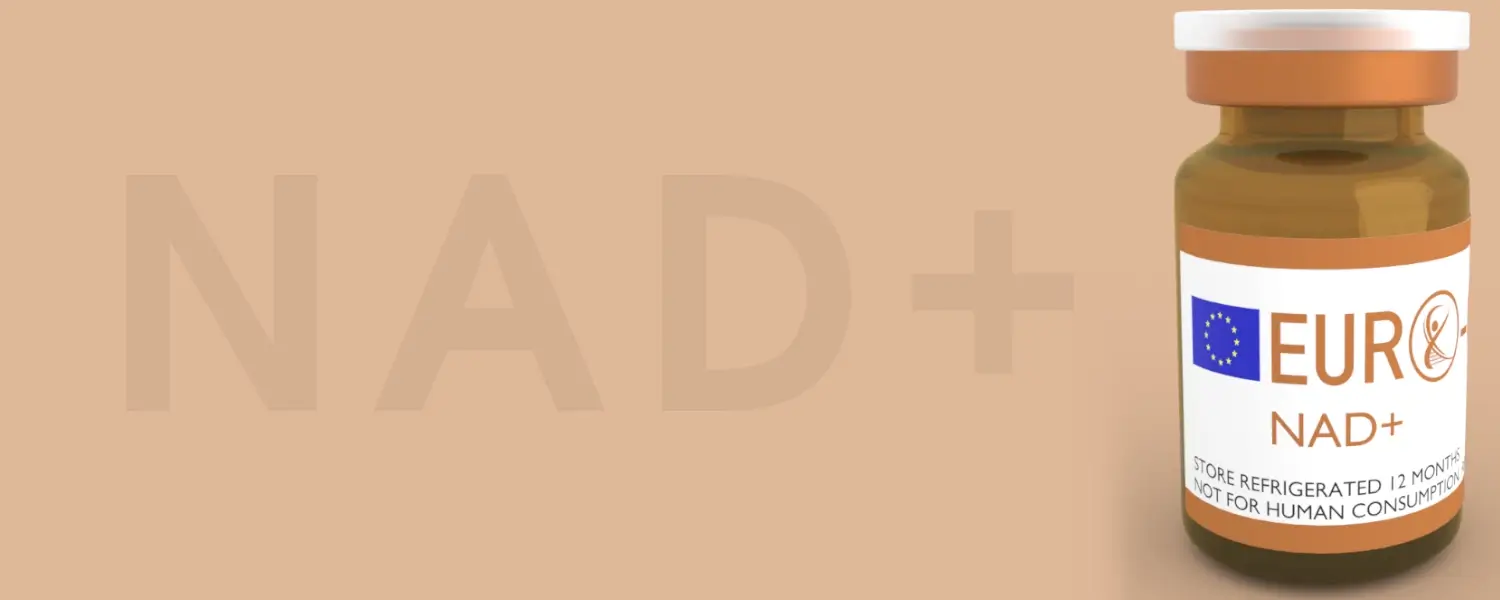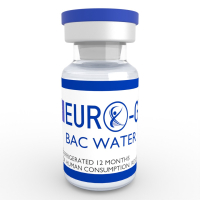Research areas: Anti-aging, longevity & skin health.


Euro-Gen NAD+, 500mg
- #58 best seller
- Sorry, out of stock.
- 500 in stock
- Hurry! Only in stock.
On sale, save 0% £135.00 £135.00
Was £135.00
Also available as a pen injector- FREE delivery by Tuesday, March 10 2026
- Fastest delivery by Sunday, March 8 2026.
-
Delivery times assume that payment is made before 3PM.
Orders and payments received after 3PM may be subject to delay.
Need help with dosage? Our dosage calculator may help.
Dosage calculatorProduct Information
Contents
Overview of NAD+
Research into NAD+ (Nicotinamide Adenine Dinucleotide) is expanding rapidly due to its central role in cellular metabolism, aging, and disease processes. NAD+ is crucial for a wide range of biological functions, particularly in energy production, DNA repair, and cellular signaling. Because NAD+ levels naturally decline with age, researchers are investigating how restoring or modulating NAD+ can promote healthspan, delay aging, and treat various age-related diseases. Below is a summary of ongoing research areas and their potential uses:
NAD+ and Aging
Aging and Longevity
NAD+ has been linked to the regulation of cellular metabolism and the aging process. As we age, NAD+ levels naturally decline in many tissues, and this reduction is thought to contribute to age-related cellular dysfunction and disease. A significant area of research is focused on whether boosting NAD+ levels could extend healthspan (the period of life spent in good health) and potentially increase lifespan.
Sirtuins Activation
NAD+ activates sirtuins, a family of proteins that regulate cellular functions such as metabolism, DNA repair, and stress resistance. The sirtuin pathway is heavily implicated in aging and longevity, and increasing NAD+ levels is thought to activate these pathways, potentially slowing down age-related diseases like Alzheimer's, Parkinson's, and cardiovascular disease.
NAD+ Boosting Interventions
Research is examining various methods to boost NAD+ levels, such as through the use of NAD+ precursors like nicotinamide riboside (NR) and nicotinamide mononucleotide (NMN), as well as strategies to enhance the body's ability to produce NAD+ naturally. Clinical trials are ongoing to test the effectiveness of these interventions in delaying aging and improving health outcomes in older adults.
NAD+ in Metabolic Diseases
Obesity and Diabetes
NAD+ is critical for energy metabolism, and its role in regulating mitochondrial function, insulin sensitivity, and fat metabolism is being actively studied. Since NAD+ levels decline with age, researchers are investigating whether boosting NAD+ could improve insulin sensitivity and treat or prevent metabolic conditions like type 2 diabetes and obesity.
Mitochondrial Dysfunction
NAD+ is essential for mitochondrial function, and mitochondrial dysfunction is a hallmark of metabolic diseases. Restoring NAD+ levels may improve mitochondrial health, reduce inflammation, and enhance energy production in cells, potentially addressing diseases like metabolic syndrome, fatty liver disease, and type 2 diabetes.
Caloric Restriction Mimicry
Some research suggests that boosting NAD+ could mimic the effects of caloric restriction, which has been shown to extend lifespan in animal models. Caloric restriction improves NAD+ metabolism, and drugs or supplements that boost NAD+ might replicate some of the beneficial effects without the need to reduce caloric intake.
NAD+ and Neurodegenerative Diseases
Alzheimer's Disease and Parkinson's Disease
NAD+ is involved in various neuroprotective pathways, including DNA repair and mitochondrial function, both of which are compromised in neurodegenerative diseases. Research is focused on whether restoring NAD+ levels could protect neurons, enhance brain function, and slow or even reverse neurodegenerative diseases like Alzheimer's, Parkinson's, and Huntington's disease.
DNA Repair
NAD+ is critical for DNA repair processes that maintain the integrity of neuronal DNA. In diseases like Alzheimer's, where DNA damage accumulates, NAD+ may play a role in preventing neuronal death and cognitive decline.
Sirtuin Activation in the Brain
Sirtuins, particularly SIRT1, have neuroprotective effects, and NAD+ is required for their activation. Research is ongoing into whether enhancing NAD+ levels can activate these sirtuins and protect brain cells from degeneration.
Cognitive Function
Studies are also investigating whether NAD+ supplementation can improve cognitive function in older adults, particularly those at risk for dementia and Alzheimer's disease.
NAD+ in Cardiovascular Health
Heart Disease and Vascular Function
NAD+ plays a critical role in maintaining the health of blood vessels, heart muscle cells, and vascular endothelium. As NAD+ levels decline with age, so does cardiovascular health. Researchers are exploring whether boosting NAD+ could improve vascular function, reduce arterial stiffness, and prevent age-related cardiovascular diseases like atherosclerosis and heart failure.
Endothelial Function and Nitric Oxide
NAD+ influences endothelial nitric oxide synthase (eNOS), which regulates blood vessel dilation. Research suggests that restoring NAD+ could improve blood flow and lower the risk of hypertension and heart disease.
Mitochondrial Health in Cardiomyocytes
NAD+ is also essential for the health of mitochondria in heart cells. Restoring NAD+ may enhance energy production in the heart, potentially protecting against conditions like heart failure and myocardial infarction.
NAD+ in Immune System Function
Immune Response and Inflammation
NAD+ plays a key role in the regulation of immune cells, including macrophages, T-cells, and dendritic cells. Research is focusing on how NAD+ modulates immune responses, particularly in the context of chronic inflammation, autoimmune diseases, and infection.
Immune Aging
As we age, the immune system weakens, leading to a phenomenon called immunosenescence. Studies are investigating whether boosting NAD+ can improve immune function in older adults and help protect against infections, cancer, and inflammatory diseases.
Inflammatory Diseases
NAD+ is involved in modulating inflammatory pathways, and its depletion is linked to chronic inflammation in conditions like arthritis, asthma, and inflammatory bowel disease (IBD). Research is exploring whether enhancing NAD+ can reduce inflammation and improve disease outcomes.
NAD+ in Cancer Therapy
Cancer Metabolism
NAD+ plays a crucial role in the metabolism of cancer cells. Many cancer cells have elevated NAD+ levels to support their rapid growth and survival. Some research is focusing on whether targeting NAD+ metabolism can inhibit cancer cell growth and enhance the effectiveness of chemotherapy and other treatments.
PARP Inhibitors
NAD+ is involved in the activity of PARP enzymes (poly(ADP-ribose) polymerases), which repair DNA damage. Some cancer treatments, particularly PARP inhibitors, aim to exploit NAD+ depletion in cancer cells. Research is exploring how modulating NAD+ levels can improve the efficacy of these therapies.
NAD+ and Tumor Microenvironment
Ongoing research is examining how NAD+ levels influence the tumor microenvironment, and whether increasing NAD+ could enhance the body's ability to fight cancer by improving immune function or reducing tumor-induced metabolic stress.
NAD+ as a Therapeutic Target
NAD+ Precursors
Clinical trials are investigating the use of NAD+ precursors like nicotinamide riboside (NR) and nicotinamide mononucleotide (NMN) to boost NAD+ levels in humans. These compounds are being tested for their ability to treat aging-related diseases, metabolic disorders, and neurodegenerative conditions.
Safety and Efficacy
Research is also focused on the long-term safety and efficacy of NAD+ supplementation, particularly in older adults or those with chronic diseases. Ongoing studies aim to determine the optimal doses and methods of administration.
NAD+
| Structure | C21H28N7O14p2+ |
|---|---|
| Synonyms | Nicotinamide-Adenine-Dinucleotide |
| PubChem profile | NAD+ on PubChem |
Write a review
Let others know about this product and help improve the peptide community as a whole! Only your name, rating, review content and date of writing will be visible to the public.
Similar items to consider
-

-

-

For research use only.
This product is exclusively designated for in vitro testing and laboratory research. All details provided on this website are for informational and educational purposes only. Any form of bodily introduction into humans or animals is strictly prohibited by law. This product is intended to be handled solely by licensed and qualified professionals. It is not a drug, food, or cosmetic, and must not be misrepresented, misused, or mislabeled as such.